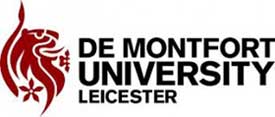Media & Communication courses
De Montfort University

- UK
- World Rank : 601
- Visit Website
Established more than 20 years ago, this dynamic course has a reputation for applied research and outstanding teaching. You can tailor your learning by choosing from theoretical study options as well as creative and professional modules and will be supported throughout by a friendly teaching team of expert academics and industry professionals. You will not only be able to gain in-depth understanding of the media environment and its employment opportunities, but you’ll also have the opportunity to explore new dimensions of theory.
Your first year focuses on core concepts in media and communication and examines the notion of media cultures and everyday life. In your second and third years you can choose from a wide range of professional, academic and creative pathways in line with your interests and ambitions to create a degree that is both fascinating and relevant to your aspirations.
Modules range from Examining the Television Industry, Considering the Role of Gender and Identity in the Media, Broadcast Journalism, Sports Journalism, Audiences and Fandom, and Political Communication, through to Public Relations and Design and Production, which explores core theories and skills for graphic and web design. As this is a joint honours degree, you will study a mixture of modules from both of your chosen subjects, broadening the career options open to you.
Students also have the chance to contribute to our very own student media group, Demon Media, and put their skills into practice across multimedia platforms including a magazine, radio station, YouTube channel and website.
First year teaching focuses on the modern media landscape where you will be encouraged to engage critically and creatively with digital, print and broadcast media as well as exploring the potential of visual media. In your second and third years you can choose from a wide range of professional, academic and creative pathways in line with your interests and ambitions to create a degree which is fascinating and relevant to your aspirations.
You can choose from theoretical options as well as from creative and professional modules and will be supported throughout your study by a friendly teaching team of media academics and industry professionals.
Entry criteria
For Film Studies and Media (P390), Journalism and Media (PPH5) and English Language and Media (QP33)
Portfolio Required : No
Interview Required: No
We welcome applications from mature students with non-standard qualifications and recognise all other equivalent and international qualifications
English language
If English is not your first language then an IELTS score of 6.0 overall with a minimum of 5.5 in each component (or equivalent) is essential.
English Language tuition, delivered by our British Council accredited Centre for English Language Learning, is available both before and throughout the course if you need it.
| Type of Institution | Public |
| Campus Setting | Urban |
| Endowment | £1.17 million |
| Number of Campuses | 4 faculties |
| Number/Percentage of International Students | 23205 |
| Total number of Professors | 3240 |
| Student Satisfaction Rate | 86% |
| Graduate Job Rate | 97.3% |
| Number of Residence Vacancy | Around 3000 |
| International fee | Undergraduates- £13240 (annual) Postgraduates- £15950 (annual) |
| Number of Academic Programs | UG, PG, Part time, distance, blended |
| Mode of Program | Full time, distance and online |
| Average Graduate Salary | 19800 pounds a year |
| Field of Study | Avg.Fees |
|---|---|
| Art, Design and Humanities: | £13,750 |
| Business and Law | £13,750-£14,550 |
| Media | £13,750 - £14,250 |
| Engineering | £14,250 |
| Computing | £14,250 |
| Health and Life Sciences | £13,250 - £14,250 |
| Nursing BSc | £14,950 |
| Expenses | Estimated cost in pounds |
|---|---|
| Undergraduate tuition fee | 13,250- 14950 |
| Postgraduate tuition fee | 13600-15,900 |
| On campus accommodation | 5,000-6040 |
| Average cost of living | 97-110 per week |
DMU International Scholarship up to 1500 pounds
| Tuition Fees in UK (1st Year Average) | MS: £17276 | MBA: £17276 | BE/Btech: £16632 | BBA: £15130 | BSc: £16632 | MFin: £19000 | MA: £15560 | MIM: £18241 | MEM: £16950 | MArch: £14271 | BHM: £12662 | MIS: £15344 | MEng: £12876 | MBBS: £28865| MPharm: £15452 |
| Average Accomodation & Food Costs in UK | £850 to £1,050 a month |
| Entrance Exams in UK | TOEFL: 88 | IELTS: 6.5 | PTE: 59 | GMAT: 590 |
| Work and Study in UK | Permitted for 20 hours/week with a valid study permit. |
| Post Study Work Permit in UK | 2 Year after graduation depending on the course. |
| Cost of Student Visa in UK | £348 |
| Student Visa in UK | Your nationality, duration of your stay and purpose of your stay are the three essential factors for UK visa. For Non-EU students UK visa is mandatory. |
| Intakes in UK | There are mainly two intakes in UK: January/February & September/October. |
| Top Job Sectors in UK | IT Engineering, Product Design, Mobile Development, Designers, Logistics, etc. |
| Economy in UK | Growth Rate: 1.3% (2018) 1.4% (2019) 1.4% (2020e), 6th Largest Economy in the World by Nominal |
Tuition & fees :
£ 13,750
Hostel & Meals :
£ 6,063
Total
£ 19,813